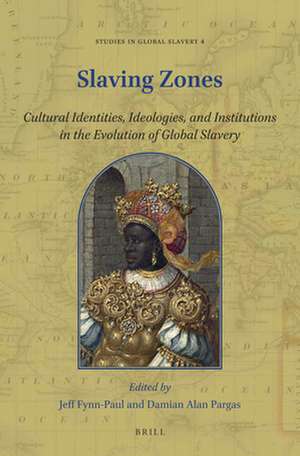Slaving Zones: Cultural Identities, Ideologies, and Institutions in the Evolution of Global Slavery: Studies in Global Slavery, cartea 4
Editat de Jeff Fynn-Paul, Damian Alan Pargasen Limba Engleză Hardback – 10 ian 2018
In Slaving Zones: Cultural Identities, Ideologies, and Institutions in the Evolution of Global Slavery, fourteen authors—including both world-leading and emerging historians of slavery—engage with the ‘Slaving Zones’ theory. This theory has recently taken the field of Mediterranean slavery studies by storm, and the challenge posed by the editors was to see if the ‘Slaving Zones’ theory could be applied in the wider context of long-term global history.
The results of this experiment are promising. In the Introduction, Jeff Fynn-Paul points out over a dozen ways in which the contributors have added to the concept of ‘Slaving Zones’, helping to make it one of the more dynamic theories of global slavery since the advent of Orlando Patterson’s Slavery and Social Death.
Preț: 1073.51 lei
Preț vechi: 1309.16 lei
-18% Nou
Puncte Express: 1610
Preț estimativ în valută:
205.44€ • 213.69$ • 169.60£
205.44€ • 213.69$ • 169.60£
Carte disponibilă
Livrare economică 24 martie-07 aprilie
Preluare comenzi: 021 569.72.76
Specificații
ISBN-13: 9789004351738
ISBN-10: 9004351736
Pagini: 364
Dimensiuni: 155 x 235 mm
Greutate: 0.68 kg
Editura: Brill
Colecția Brill
Seria Studies in Global Slavery
ISBN-10: 9004351736
Pagini: 364
Dimensiuni: 155 x 235 mm
Greutate: 0.68 kg
Editura: Brill
Colecția Brill
Seria Studies in Global Slavery
Notă biografică
Jeff Fynn-Paul, PhD (2005), University of Toronto, is Lecturer of Economic and Social History at Leiden University. He has published several monographs and articles on urban history and slavery, focusing on late medieval Iberia and the Mediterranean. Among other awards, he is recipient of the 2016 European History Quarterly Prize.
Damian Alan Pargas, Ph.D. (2009), Leiden University, is Lecturer of Economic and Social History at Leiden University. He has published several monographs and articles on American Slavery in the nineteenth century. He is recipient and supervisor of the NWO Vidi project “Beacons of Freedom: Slave Refugees in North America, 1800-1860”.
Damian Alan Pargas, Ph.D. (2009), Leiden University, is Lecturer of Economic and Social History at Leiden University. He has published several monographs and articles on American Slavery in the nineteenth century. He is recipient and supervisor of the NWO Vidi project “Beacons of Freedom: Slave Refugees in North America, 1800-1860”.
Cuprins
Preface
List of Illustrations
Notes on Contributors
1 Introduction. Slaving Zones in Global History: The Evolution of a Concept
Jeff Fynn-Paul
Part I. Slaving Zones to the Dawn of the Modern Era
2 “To Serve Them All the More”: Christian Slaveholders and Christian Slaves in Antiquity
Jennifer A. Glancy
3 Christianities in Conflict: The Black Sea as a Genoese Slaving Zone in the Later Middle Ages
Hannah Barker
4 Considerations About the Territorial Distribution of Slaves in the Romanian Principalities
Viorel Achim
5 Iberia’s Old World Slaving Zones in the Late Medieval and Early Modern Periods
William D. Phillips, Jr.
6 Chasing ‘Caribs’: Defining Zones of Legal Indigenous Enslavement in the Circum-Caribbean, 1493–1542
Erin Stone
Part II. Slaving Zones in Modern Times (18th Century-Present)
7 How Useful is the Concept of Slaving Zones? Some Thoughts from the Experience of Dahomey and Kongo
John K. Thornton
8 Some Thoughts Concerning the Effects of the European Slave Trade on the Dynamics of Slavery in Madagascar in the Seventeenth and Eighteenth Centuries
Rafaël Thiebaut
9 “Hearing the Sound of the Flute from Zanzibar”: Migrating Communities and Slave Trade Routes in the Indian Ocean
Beatrice Nicolini
10 Slave Protection and Resistance in Colonial Mauritius, 1829–1830
Tyler Yank
Part III. Slaving Zones in a Post-Abolition World
11 The Price You Pay: Choosing Family, Friends, and Familiarity Over Freedom in the Leeward Islands, 1835–1863
Jessica Roitman
12 Black Bondspeople, White Masters and Mistresses, and the Americanization of the Upper Mississippi River Valley Lead District
Jennifer Kirsten Stinson
13 A Female Slaving Zone? Historical Constructions of the Traffic in Asian Women
Julia Martinez
14 “Slaving Zones, Contemporary Slavery and Citizenship: Reflections from the Brazilian Case”
Alexis Jonathan Martig
Index
List of Illustrations
Notes on Contributors
1 Introduction. Slaving Zones in Global History: The Evolution of a Concept
Jeff Fynn-Paul
Part I. Slaving Zones to the Dawn of the Modern Era
2 “To Serve Them All the More”: Christian Slaveholders and Christian Slaves in Antiquity
Jennifer A. Glancy
3 Christianities in Conflict: The Black Sea as a Genoese Slaving Zone in the Later Middle Ages
Hannah Barker
4 Considerations About the Territorial Distribution of Slaves in the Romanian Principalities
Viorel Achim
5 Iberia’s Old World Slaving Zones in the Late Medieval and Early Modern Periods
William D. Phillips, Jr.
6 Chasing ‘Caribs’: Defining Zones of Legal Indigenous Enslavement in the Circum-Caribbean, 1493–1542
Erin Stone
Part II. Slaving Zones in Modern Times (18th Century-Present)
7 How Useful is the Concept of Slaving Zones? Some Thoughts from the Experience of Dahomey and Kongo
John K. Thornton
8 Some Thoughts Concerning the Effects of the European Slave Trade on the Dynamics of Slavery in Madagascar in the Seventeenth and Eighteenth Centuries
Rafaël Thiebaut
9 “Hearing the Sound of the Flute from Zanzibar”: Migrating Communities and Slave Trade Routes in the Indian Ocean
Beatrice Nicolini
10 Slave Protection and Resistance in Colonial Mauritius, 1829–1830
Tyler Yank
Part III. Slaving Zones in a Post-Abolition World
11 The Price You Pay: Choosing Family, Friends, and Familiarity Over Freedom in the Leeward Islands, 1835–1863
Jessica Roitman
12 Black Bondspeople, White Masters and Mistresses, and the Americanization of the Upper Mississippi River Valley Lead District
Jennifer Kirsten Stinson
13 A Female Slaving Zone? Historical Constructions of the Traffic in Asian Women
Julia Martinez
14 “Slaving Zones, Contemporary Slavery and Citizenship: Reflections from the Brazilian Case”
Alexis Jonathan Martig
Index














